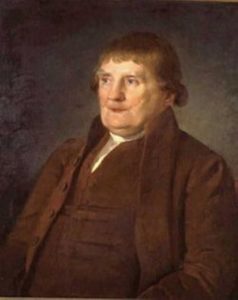
Anthony Benezet
*Anthony Benezet was born on this date in 1713. He was a white-French American abolitionist from St. Quentin, northern France, and a member of a family of Huguenots (French Protestants).
In 1715, when Benezet was two years old, they immigrated to London, where he was educated. In 1731, at age 17, Benezet and his family immigrated to Philadelphia, PA (then), a British American colony. In the United States, Benezet joined the Society of Friends Quaker community. His early attempts in business were unsuccessful, and in 1739, he became a schoolteacher at Germantown. Three years later, he moved to a position at the Friends' English School of Philadelphia (now the William Penn Charter School).
There, he was noted both for being a fine teacher and for disliking the severe discipline that was common. In 1750, he set up an evening class for slave children, which he ran from home. In 1754, he left the Friends' English School to set up one exclusively for girls, the first public girls' school in America. From at least the 1750s, Benezet became a firm opponent of slavery. His campaign, very much solitary at first, took two forms.
First, he worked to convince his Quaker brethren in Philadelphia that slave-owning was not consistent with Christian doctrine. Secondly, he wrote and published, at his own expense, several anti-slavery tracts and pamphlets. He was dogged by illness and was not able to maintain the school. Nevertheless, he continued to teach slave children until 1770, when, with the support of the Society of Friends, he set up the Negro School in Philadelphia. He subsequently taught at both of these schools almost until his death. Of his writings, Some Historical Account of Guinea, written in 1772, was by far the most influential on both sides of the Atlantic.
The pamphlet was read and, to a certain extent, imitated by Granville Sharp and John Wesley, who corresponded with Benezet and distributed his works in England. Several years later, Benezet's works were instrumental in persuading Thomas Clarkson to embark on his abolitionist career. Benezet's Some Historical Account of Guinea was reprinted several times during the height of the abolition campaign. Benezet, however, did not live to see anti-slavery become a powerful force, either in Britain or America. He died on May 3, 1784, and is buried in the Friends Burial Ground, Philadelphia. Benezet perhaps qualifies more as an American than a British abolitionist, but his influence on the British abolition campaign has merit.